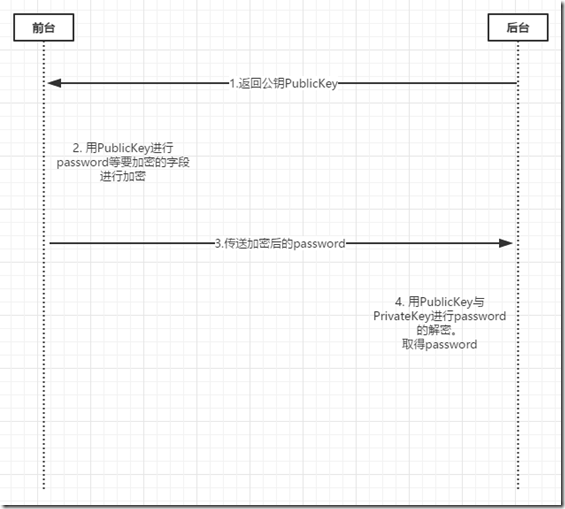加密–RSA前端与后台的加密&解密
1. 前言
本问是根据网上很多文章的总结得到的。
2. 介绍
RSA加密算法是一种非对称加密算法。
对极大整数做因数分解的难度决定了RSA算法的可靠性。换言之,对一极大整数做因数分解愈困难,RSA算法愈可靠。假如有人找到一种快速因数分解的算法的话,那么用RSA加密的信息的可靠性就肯定会极度下降。但找到这样的算法的可能性是非常小的。今天只有短的RSA钥匙才可能被强力方式解破。到2016年为止,世界上还没有任何可靠的攻击RSA算法的方式。只要其钥匙的长度足够长,用RSA加密的信息实际上是不能被解破的。
1983年麻省理工学院在美国为RSA算法申请了专利。这个专利2000年9月21日失效。由于该算法在申请专利前就已经被发表了,在世界上大多数其它地区这个专利权不被承认。
具体介绍可以查看维基百科
https://zh.wikipedia.org/wiki/RSA%E5%8A%A0%E5%AF%86%E6%BC%94%E7%AE%97%E6%B3%95
3. 开始
1)在线RSA加密,请选用PKCS#1来生成公钥与私钥
http://web.chacuo.net/netrsakeypair
点击【生成秘钥对RSA】就可以生成对应的非对称加密公钥与非对称加密似钥
2)前端JS框架
http://travistidwell.com/jsencrypt/
3)流程图
从上图可以看到,先从网站上生成publicKey与privateKey。
第一步返回publicKey前端,用来对password等敏感字段的加密。
第二步,前端进行password敏感字段的加密。
第三步post数据给后端。
第四步用publicKey与privateKey进行解密。
4.代码
这里的代码是简单的直接从前端访问后台,后台进行解密。逻辑根据读者的爱好编写。
前端代码
<!DOCTYPE html>
<html xmlns="http://www.w3.org/1999/xhtml">
<head runat="server">
<meta http-equiv="Content-Type" content="text/html; charset=utf-8" />
<title></title>
<script src="http://code.jquery.com/jquery-1.8.3.min.js"></script>
<script src="http://passport.cnblogs.com/scripts/jsencrypt.min.js"></script>
<script type="text/javascript">
// 使用jsencrypt类库加密js方法,
function encryptRequest(reqUrl, data, publicKey) {
var encrypt = new JSEncrypt();
encrypt.setPublicKey(publicKey);
// ajax请求发送的数据对象
var sendData = new Object();
// 将data数组赋给ajax对象
for (var key in data) {
sendData[key] = encrypt.encrypt(data[key]);
}
$.ajax({
url: reqUrl,
type: 'post',
data: sendData,
dataType: 'json',
//contentType: 'application/json; charset=utf-8',
success: function (data) {
console.info(data);
},
error: function (xhr) {
//console.error('出错了');
}
});
}
// Call this code when the page is done loading.
$(function () {
$('#testme').click(function () {
var data = [];
data['username'] = $('#username').val();
data['passwd'] = $('#passwd').val();
var pkey = $('#pubkey').val();
encryptRequest('/WebForm2.aspx', data, pkey);
});
});
</script>
</head>
<body>
<form id="form1" runat="server">
<div>
<label for="pubkey">Public Key</label><br />
<textarea id="pubkey" rows="15" cols="65">
MIGfMA0GCSqGSIb3DQEBAQUAA4GNADCBiQKBgQCDbrIgHK8qkz5IfK/A7At4SVZQ
31TalDPsc4vzeDVjd5ao46hcf+eOEQNm8jmxxHTm6WPSTy7RDVXG/NI489L9okkd
K++kVh2Z9GjBo5jw/n9EYojt8aYyEOc6cMHT2Fv+1smG+X/W2HeXXoJJjcFLSjBe
CKx1SoCD4+B2ZiDQ8wIDAQAB
</textarea><br />
<label for="input">Text to encrypt:</label><br />
name:<input id="username" name="username" type="text"></input><br />
password:<input id="passwd" name="passwd" type="password"></input><br />
<input id="testme" type="button" value="submit" /><br />
</div>
</form>
</body>
</html>
后端代码
解密
private RSACrypto rsaCrypto = new RSACrypto(PublicAttribute.PrivateKey, PublicAttribute.PublicKey); //获取参数 string usernameEncode = Request["username"]; string pwdEncode = Request["pwd"]; //解密 RSA string username = rsaCrypto.Decrypt(usernameEncode); string pwd = rsaCrypto.Decrypt(pwdEncode);
类 RSACrypto
public class RSACrypto
{
private RSACryptoServiceProvider _privateKeyRsaProvider;
private RSACryptoServiceProvider _publicKeyRsaProvider;
public RSACrypto(string privateKey, string publicKey = null)
{
if (!string.IsNullOrEmpty(privateKey))
{
_privateKeyRsaProvider = CreateRsaProviderFromPrivateKey(privateKey);
}
if (!string.IsNullOrEmpty(publicKey))
{
_publicKeyRsaProvider = CreateRsaProviderFromPublicKey(publicKey);
}
}
public string Decrypt(string cipherText)
{
if (_privateKeyRsaProvider == null)
{
throw new Exception("_privateKeyRsaProvider is null");
}
return Encoding.UTF8.GetString(_privateKeyRsaProvider.Decrypt(System.Convert.FromBase64String(cipherText), false));
}
public string Encrypt(string text)
{
if (_publicKeyRsaProvider == null)
{
throw new Exception("_publicKeyRsaProvider is null");
}
return Convert.ToBase64String(_publicKeyRsaProvider.Encrypt(Encoding.UTF8.GetBytes(text), false));
}
private RSACryptoServiceProvider CreateRsaProviderFromPrivateKey(string privateKey)
{
var privateKeyBits = System.Convert.FromBase64String(privateKey);
var RSA = new RSACryptoServiceProvider();
var RSAparams = new RSAParameters();
using (BinaryReader binr = new BinaryReader(new MemoryStream(privateKeyBits)))
{
byte bt = 0;
ushort twobytes = 0;
twobytes = binr.ReadUInt16();
if (twobytes == 0x8130)
binr.ReadByte();
else if (twobytes == 0x8230)
binr.ReadInt16();
else
throw new Exception("Unexpected value read binr.ReadUInt16()");
twobytes = binr.ReadUInt16();
if (twobytes != 0x0102)
throw new Exception("Unexpected version");
bt = binr.ReadByte();
if (bt != 0x00)
throw new Exception("Unexpected value read binr.ReadByte()");
RSAparams.Modulus = binr.ReadBytes(GetIntegerSize(binr));
RSAparams.Exponent = binr.ReadBytes(GetIntegerSize(binr));
RSAparams.D = binr.ReadBytes(GetIntegerSize(binr));
RSAparams.P = binr.ReadBytes(GetIntegerSize(binr));
RSAparams.Q = binr.ReadBytes(GetIntegerSize(binr));
RSAparams.DP = binr.ReadBytes(GetIntegerSize(binr));
RSAparams.DQ = binr.ReadBytes(GetIntegerSize(binr));
RSAparams.InverseQ = binr.ReadBytes(GetIntegerSize(binr));
}
RSA.ImportParameters(RSAparams);
return RSA;
}
private int GetIntegerSize(BinaryReader binr)
{
byte bt = 0;
byte lowbyte = 0x00;
byte highbyte = 0x00;
int count = 0;
bt = binr.ReadByte();
if (bt != 0x02)
return 0;
bt = binr.ReadByte();
if (bt == 0x81)
count = binr.ReadByte();
else
if (bt == 0x82)
{
highbyte = binr.ReadByte();
lowbyte = binr.ReadByte();
byte[] modint = { lowbyte, highbyte, 0x00, 0x00 };
count = BitConverter.ToInt32(modint, 0);
}
else
{
count = bt;
}
while (binr.ReadByte() == 0x00)
{
count -= 1;
}
binr.BaseStream.Seek(-1, SeekOrigin.Current);
return count;
}
private RSACryptoServiceProvider CreateRsaProviderFromPublicKey(string publicKeyString)
{
// encoded OID sequence for PKCS #1 rsaEncryption szOID_RSA_RSA = "1.2.840.113549.1.1.1"
byte[] SeqOID = { 0x30, 0x0D, 0x06, 0x09, 0x2A, 0x86, 0x48, 0x86, 0xF7, 0x0D, 0x01, 0x01, 0x01, 0x05, 0x00 };
byte[] x509key;
byte[] seq = new byte[15];
int x509size;
x509key = Convert.FromBase64String(publicKeyString);
x509size = x509key.Length;
// --------- Set up stream to read the asn.1 encoded SubjectPublicKeyInfo blob ------
using (MemoryStream mem = new MemoryStream(x509key))
{
using (BinaryReader binr = new BinaryReader(mem)) //wrap Memory Stream with BinaryReader for easy reading
{
byte bt = 0;
ushort twobytes = 0;
twobytes = binr.ReadUInt16();
if (twobytes == 0x8130) //data read as little endian order (actual data order for Sequence is 30 81)
binr.ReadByte(); //advance 1 byte
else if (twobytes == 0x8230)
binr.ReadInt16(); //advance 2 bytes
else
return null;
seq = binr.ReadBytes(15); //read the Sequence OID
if (!CompareBytearrays(seq, SeqOID)) //make sure Sequence for OID is correct
return null;
twobytes = binr.ReadUInt16();
if (twobytes == 0x8103) //data read as little endian order (actual data order for Bit String is 03 81)
binr.ReadByte(); //advance 1 byte
else if (twobytes == 0x8203)
binr.ReadInt16(); //advance 2 bytes
else
return null;
bt = binr.ReadByte();
if (bt != 0x00) //expect null byte next
return null;
twobytes = binr.ReadUInt16();
if (twobytes == 0x8130) //data read as little endian order (actual data order for Sequence is 30 81)
binr.ReadByte(); //advance 1 byte
else if (twobytes == 0x8230)
binr.ReadInt16(); //advance 2 bytes
else
return null;
twobytes = binr.ReadUInt16();
byte lowbyte = 0x00;
byte highbyte = 0x00;
if (twobytes == 0x8102) //data read as little endian order (actual data order for Integer is 02 81)
lowbyte = binr.ReadByte(); // read next bytes which is bytes in modulus
else if (twobytes == 0x8202)
{
highbyte = binr.ReadByte(); //advance 2 bytes
lowbyte = binr.ReadByte();
}
else
return null;
byte[] modint = { lowbyte, highbyte, 0x00, 0x00 }; //reverse byte order since asn.1 key uses big endian order
int modsize = BitConverter.ToInt32(modint, 0);
int firstbyte = binr.PeekChar();
if (firstbyte == 0x00)
{ //if first byte (highest order) of modulus is zero, don't include it
binr.ReadByte(); //skip this null byte
modsize -= 1; //reduce modulus buffer size by 1
}
byte[] modulus = binr.ReadBytes(modsize); //read the modulus bytes
if (binr.ReadByte() != 0x02) //expect an Integer for the exponent data
return null;
int expbytes = (int)binr.ReadByte(); // should only need one byte for actual exponent data (for all useful values)
byte[] exponent = binr.ReadBytes(expbytes);
// ------- create RSACryptoServiceProvider instance and initialize with public key -----
RSACryptoServiceProvider RSA = new RSACryptoServiceProvider();
RSAParameters RSAKeyInfo = new RSAParameters();
RSAKeyInfo.Modulus = modulus;
RSAKeyInfo.Exponent = exponent;
RSA.ImportParameters(RSAKeyInfo);
return RSA;
}
}
}
private bool CompareBytearrays(byte[] a, byte[] b)
{
if (a.Length != b.Length)
return false;
int i = 0;
foreach (byte c in a)
{
if (c != b[i])
return false;
i++;
}
return true;
}
}
到此结束了。







